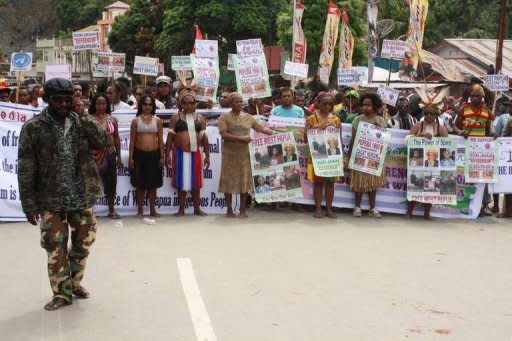Thousands protest against Indonesian rule in Papua
Around 10,000 Papuans protested Tuesday for independence from Indonesia, defying a heavy police presence a day after a deadly ambush that police blamed on separatist rebels, witnesses said. Demonstrators in the provincial capital Jayapura shouted "Free Papua" and demanded the withdrawal of Indonesian troops from the eastern region, the scene of a low-level separatist insurgency since the 1960s. Other protests were held in Timika, on the southern coast, and in the Indonesian capital Jakarta where hundreds rallied to express support for an independence referendum of the sort granted to East Timor in 1999. Around 700 heavily armed anti-riot police were deployed in Jayapura, which was tense after unknown gunmen killed four people in a pre-dawn ambush on a road outside the city on Monday. Police blocked a road to prevent the protesters from reaching the provincial parliament building, although organisers said they had a permit to demonstrate. "We call for a referendum. This is not Papua's problem or Indonesia's problem. This is an international problem. We want independence," protest coordinator Mako Tambuni said. The rally ended without incident, witnesses said. Indonesian police were quick to blame Free Papua Movement (OPM) rebels for the ambush, saying a Morning Star independence flag had been found planted in the ground nearby. But local OPM commander Lambert Pekikir rejected the allegations and said the killings were the work of the military to boost their claims for extra funding and resources. "I strongly condemn those allegations, they're false," Pekikir told AFP by phone from an unknown location, adding that the senior leadership of the poorly-armed indigenous militia had ordered fighters to "lay down our arms". "When there's a shooting, that's certainly committed by the military, if not the police. They're using OPM as a scapegoat by pushing the blame on us," Pekikir said. Indigenous Melanesian rebels often armed with little more than bows and arrows are fighting a low-intensity insurgency against Indonesian rule to end what they say is the oppression and exploitation of the Papuan people. The Indonesian military has long been accused of serious human rights abuses against Papuan civilians, as well as massive corruption in the form of protection rackets for mining operations and illegal logging. "All this is business for the military. When civilians are killed, there will be a lot of money flowing from the central government to Jayapura to maintain peace and security," Pekikir said. "Certain groups may accuse us of the shooting, but Papuans will never believe it. Papuans trust the OPM." The allegations are difficult to confirm because foreign journalists and rights workers are banned from entering the province to report on such issues, despite Indonesia's assurances that the rebels' claims are baseless. In further political violence, clashes between supporters of rival candidates for district elections killed 17 people in a remote village hundreds of kilometres (miles) to the southwest of Jayapura on Sunday. Police said the unrest in Puncak district was not related to the shootings near Jayapura. Tuesday's protests were timed to coincide with a meeting of international lawyers, politicians and tribal leaders in Oxford, England, to examine the Papua issue. The Road To Freedom conference, chaired by British MP Andrew Smith, will review the 1969 Act of Free Choice by which Indonesia took control of Papua. Many Papuans argue to this day that the vote was a sham. "They can look at the case. Itâs very important for our struggle," exiled Papuan independence leader Benny Wenda said, according to Radio New Zealand International.



